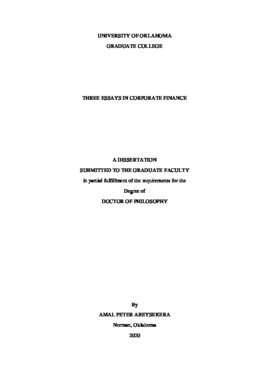| dc.contributor.advisor | Fernando, Chitru | |
| dc.contributor.author | Abeysekera, Amal | |
| dc.date.accessioned | 2020-05-05T21:08:11Z | |
| dc.date.available | 2020-05-05T21:08:11Z | |
| dc.date.issued | 2020-05-08 | |
| dc.identifier.uri | https://hdl.handle.net/11244/324276 | |
| dc.description.abstract | This dissertation comprises of three essays. The first essay (Chapter 1) looks at the incidence of sexual harassment in U.S. S&P 500 firms, and its relationship to shareholder value. The second essay (Chapter 2) is an investigation of the differences in policy toward corporate social responsibility (CSR) between family and non-family firms, using environmental performance as the proxy for CSR. The last essay (Chapter 3) investigates the undiversified shareholder rationale for corporate risk management by comparing the hedging behavior of family firms and non-family firms in the oil and gas industry between 1998 and 2015.
While sexual harassment has remained pervasive in the United States, its implications on shareholder value are not fully understood. In Chapter 1, I explore the value implications of sexual harassment. I find that public announcements of sexual harassment are associated with stock market losses that are both statistically and economically significant, as exemplified by an average abnormal drop in market capitalization of $419 million. In contrast, the average victim settlement is only $18.7 million. I find that investors react significantly less negatively if the firm takes action proactively, including by firing the perpetrator/s. Interestingly, I also find that a better corporate culture is associated with more sexual harassment cases being revealed, suggesting that such firms provide a safer reporting environment for victims. A firm is more likely to take action if it has higher institutional ownership, the victim is a woman, the perpetrator is a top manager, or the reported incident took place after the advent of the #MeToo movement. While the number of public announcements of sexual harassment escalated sharply following the start of the #MeToo movement on October 15, 2017, I find no significant difference in the market reactions before and after #MeToo.
Recent literature suggests that some socially responsible corporate actions benefit shareholders while others do not. Chapter 2 shows that family firms are more responsible to shareholders than non-family firms in making environmental investments. When shareholder interests and societal interests coincide, i.e., when it comes to alleviating environmental concerns that have potential to harm society and elevate the firm’s risk exposure, family firms do at least as well as non-family firms in protecting shareholder interests. However, when shareholder and societal interests diverge, i.e., when it comes to making environmental investments that might benefit society but do not benefit shareholders, family firms protect shareholder interests by undertaking a significantly lower level of such investments than non-family firms. These findings suggest that lack of diversification by controlling families creates strong incentives for them to act in the financial interest of all shareholders, which more than overcomes any noneconomic benefits families may derive from engaging in social causes that do not benefit non-controlling shareholders.
Theory suggests that family firms should be more risk averse and engage in more hedging due to the presence of undiversified stakeholders in these firms. However, empirical evidence on this prediction has been inconclusive at best. Chapter 3 shows that, on average, family firms are about 30% more likely to hedge than non-family firms. Further, an additional family member on the board of directors is associated with a 5% higher likelihood that the firm is also a hedger and that hedging increases nonlinearly with family ownership. Interestingly, founder CEOs are especially likely to engage in hedging. These results are not driven by the 2008 spike in oil prices. However, FAS 123R may have moderated the difference in hedging between family and non-family firms. | en_US |
| dc.description.tableofcontents | Chapter 1. Sexual harassment, corporate culture and shareholder value | |
| dc.description.tableofcontents | Chapter 2. Corporate social responsibility versus corporate shareholder responsibility : a family firm perspective | |
| dc.description.tableofcontents | Chapter 3. Undiversified shareholders and corporate hedging : evidence from family firms | |
| dc.language | en | en_US |
| dc.rights | Attribution-NonCommercial-NoDerivatives 4.0 International | * |
| dc.rights.uri | https://creativecommons.org/licenses/by-nc-nd/4.0/ | * |
| dc.subject | Sexual Harassment | en_US |
| dc.subject | Corporate Social Responsibility | en_US |
| dc.subject | Family Firms | en_US |
| dc.subject | #MeToo | en_US |
| dc.subject | Corporate Governance | en_US |
| dc.subject.lcsh | Sexual harassment | |
| dc.subject.lcsh | Corporate culture | |
| dc.subject.lcsh | Social responsibility of business | |
| dc.subject.lcsh | Corporate governance | |
| dc.title | Three Essays in Corporate Finance | en_US |
| dc.contributor.committeeMember | Linn, Scott | |
| dc.contributor.committeeMember | Litov, Lubomir | |
| dc.contributor.committeeMember | Megginson, William | |
| dc.contributor.committeeMember | Ghosh, Pallab | |
| dc.date.manuscript | 2020-05-01 | |
| dc.thesis.degree | Ph.D. | en_US |
| ou.group | Michael F. Price College of Business | en_US |
| shareok.orcid | 0000-0002-8749-1644 | en_US |
| shareok.nativefileaccess | restricted | en_US |

